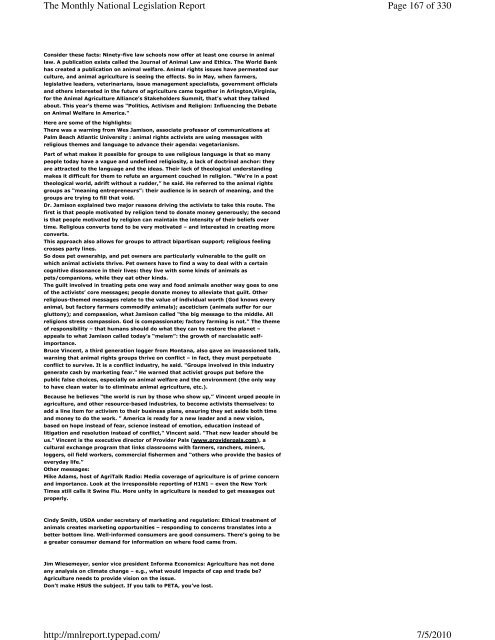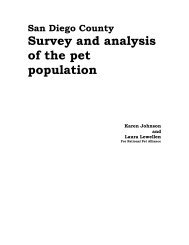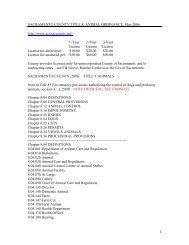Page 1 of 330 The Monthly National Legislation Report 7/5/2010 ...
Page 1 of 330 The Monthly National Legislation Report 7/5/2010 ...
Page 1 of 330 The Monthly National Legislation Report 7/5/2010 ...
You also want an ePaper? Increase the reach of your titles
YUMPU automatically turns print PDFs into web optimized ePapers that Google loves.
<strong>The</strong> <strong>Monthly</strong> <strong>National</strong> <strong>Legislation</strong> <strong>Report</strong>http://mnlreport.typepad.com/<strong>Page</strong> 167 <strong>of</strong> <strong>330</strong>7/5/<strong>2010</strong>Consider these facts: Ninety-five law schools now <strong>of</strong>fer at least one course in animallaw. A publication exists called the Journal <strong>of</strong> Animal Law and Ethics. <strong>The</strong> World Bankhas created a publication on animal welfare. Animal rights issues have permeated ourculture, and animal agriculture is seeing the effects. So in May, when farmers,legislative leaders, veterinarians, issue management specialists, government <strong>of</strong>ficialsand others interested in the future <strong>of</strong> agriculture came together in Arlington,Virginia,for the Animal Agriculture Alliance’s Stakeholders Summit, that’s what they talkedabout. This year’s theme was "Politics, Activism and Religion: Influencing the Debateon Animal Welfare in America."Here are some <strong>of</strong> the highlights:<strong>The</strong>re was a warning from Wes Jamison, associate pr<strong>of</strong>essor <strong>of</strong> communications atPalm Beach Atlantic University : animal rights activists are using messages withreligious themes and language to advance their agenda: vegetarianism.Part <strong>of</strong> what makes it possible for groups to use religious language is that so manypeople today have a vague and undefined religiosity, a lack <strong>of</strong> doctrinal anchor: theyare attracted to the language and the ideas. <strong>The</strong>ir lack <strong>of</strong> theological understandingmakes it difficult for them to refute an argument couched in religion. “We’re in a posttheological world, adrift without a rudder,” he said. He referred to the animal rightsgroups as “meaning entrepreneurs”: their audience is in search <strong>of</strong> meaning, and thegroups are trying to fill that void.Dr. Jamison explained two major reasons driving the activists to take this route. <strong>The</strong>first is that people motivated by religion tend to donate money generously; the secondis that people motivated by religion can maintain the intensity <strong>of</strong> their beliefs overtime. Religious converts tend to be very motivated – and interested in creating moreconverts.This approach also allows for groups to attract bipartisan support; religious feelingcrosses party lines.So does pet ownership, and pet owners are particularly vulnerable to the guilt onwhich animal activists thrive. Pet owners have to find a way to deal with a certaincognitive dissonance in their lives: they live with some kinds <strong>of</strong> animals aspets/companions, while they eat other kinds.<strong>The</strong> guilt involved in treating pets one way and food animals another way goes to one<strong>of</strong> the activists’ core messages; people donate money to alleviate that guilt. Otherreligious-themed messages relate to the value <strong>of</strong> individual worth (God knows everyanimal, but factory farmers commodify animals); asceticism (animals suffer for ourgluttony); and compassion, what Jamison called “the big message to the middle. Allreligions stress compassion. God is compassionate; factory farming is not.” <strong>The</strong> theme<strong>of</strong> responsibility – that humans should do what they can to restore the planet –appeals to what Jamison called today’s “meism”: the growth <strong>of</strong> narcissistic selfimportance.Bruce Vincent, a third generation logger from Montana, also gave an impassioned talk,warning that animal rights groups thrive on conflict – in fact, they must perpetuateconflict to survive. It is a conflict industry, he said. "Groups involved in this industrygenerate cash by marketing fear.” He warned that activist groups put before thepublic false choices, especially on animal welfare and the environment (the only wayto have clean water is to eliminate animal agriculture, etc.).Because he believes “the world is run by those who show up,” Vincent urged people inagriculture, and other resource-based industries, to become activists themselves: toadd a line item for activism to their business plans, ensuring they set aside both timeand money to do the work. " America is ready for a new leader and a new vision,based on hope instead <strong>of</strong> fear, science instead <strong>of</strong> emotion, education instead <strong>of</strong>litigation and resolution instead <strong>of</strong> conflict," Vincent said. "That new leader should beus." Vincent is the executive director <strong>of</strong> Provider Pals (www.providerpals.com), acultural exchange program that links classrooms with farmers, ranchers, miners,loggers, oil field workers, commercial fishermen and “others who provide the basics <strong>of</strong>everyday life.”Other messages:Mike Adams, host <strong>of</strong> AgriTalk Radio: Media coverage <strong>of</strong> agriculture is <strong>of</strong> prime concernand importance. Look at the irresponsible reporting <strong>of</strong> H1N1 – even the New YorkTimes still calls it Swine Flu. More unity in agriculture is needed to get messages outproperly.Cindy Smith, USDA under secretary <strong>of</strong> marketing and regulation: Ethical treatment <strong>of</strong>animals creates marketing opportunities – responding to concerns translates into abetter bottom line. Well-informed consumers are good consumers. <strong>The</strong>re’s going to bea greater consumer demand for information on where food came from.Jim Wiesemeyer, senior vice president Informa Economics: Agriculture has not doneany analysis on climate change – e.g., what would impacts <strong>of</strong> cap and trade be?Agriculture needs to provide vision on the issue.Don’t make HSUS the subject. If you talk to PETA, you’ve lost.




